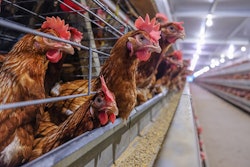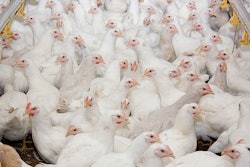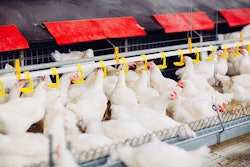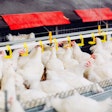
When we emerge from the novel coronavirus crisis, the world, including the poultry industry, won’t go back to business as usual - that ought to be clear for all of us. What is the COVID-19 pandemic teaching us and how can be prepare for the post-virus world?
We all make a number of assumptions about how the world is, or how it should be, but the current crisis requires us to question these assumptions if we are to flourish in a post-virus world. Nothing may ever be the same again, and it is worth thinking about how businesses might be run differently. There are a number of key areas that are worth consideration:
Embrace online
The world may now be online, but too many people are still reluctant to embrace the internet.
This would appear to particularly be the case in agriculture, with too many justifying their resistance to change saying, “We’ve always done it this way and can never change.”
For many, never meeting customers or suppliers in person is unimaginable, yet an ever-increasing number of agtech start-ups offer trading platforms that eliminate this need, while increasing transparency, reducing cost and saving time.
It is worth thinking long and hard about why we need face-to-face meetings with doctors, lawyers, accountants or other professionals when so much of what they offer is available online - and may even be done better via an online platform.
Could you move your business online and reject old practices?
Only 4% and 5%, of U.S. and U.K. workers, respectively, work from home. The average American now commutes 26 minutes to work and 26 minutes home. This totals 52 lost minutes a day, the most since records began. In the U.K., the figure is 46 minutes.
Interestingly, commute times tend to lengthen as employee's age, with over 40s spending 67 minutes a day travelling to and from work. This adds up to more than one week a year simply driving to and from the office!
A key message from my Chinese colleagues when I ask them what they have learned from recent months is that they now know that they can work as well from home as they do in the in the office, adding that they will never work solely from the office again.
This change has occurred at the right time. Today’s technologies are allowing people to work from home in a way that could not have been imagined as recently as 10 years ago. COVID-19 has shaken the workplace model to its foundation, and the world of work will never be the same again.
It must, nevertheless, be recognized that, for many, reading body language and employing emotional intelligence remain important, and these factors could encourage a return to pre-virus working patterns. Now, however, is the time to question where greater value lies.
Train and retrain
In the COVID-19 world, those that have been home schooled start with an inherent advantage. Home working has also brought into focus the need to be fully computer literate. Are your employees fully computer skilled?
We have been catapulted into a world where traditional education models are in trouble, and this could make continuous learning – online – essential, making educated staff the winners in the employment and salary stakes.
The virus lockdown offers the ideal opportunity for the poultry and other industries to embrace courses, new languages and skills, and gain certification. Universities and institutes may be the obvious ports of call, but platforms such as Linkedin, YouTube and Wechat also offer free training and unbeatable opportunities.
Every company’s maxim needs to be – don’t return to work post-corona without an increased skill set.

Working from home can offer the opportunity to learn new skills, creating value for company and employee alike. (artiemedvedev | BigStock.com)
Customer loyalty
Anyone who has seen supermarket shelves cleared of eggs, chicken, pork, beef and even Spam will smile in response to the predictions of meat’s demise.
It is human nature to seek refuge in the tried and tested rather than, in the case of food, looking to organic with its all too common recalls, or meat produced in a fermenter or petri dish. Looking for a safe haven in a crisis is natural.
As demand for poultry surges, it should be no surprise that food suppliers are supportive of suppliers who support them. Similarly, employees will be unlikely to switch company now or in six months’ time.
Of course, this halo of loyalty can easily vanish, but much depends on whether you believe that this the last virus, or global crisis, that we are likely to face. Whatever you may believe, this is an opportunity that can be used to advantage, to build solid teams and to create a clear business direction.
Safe food, safe investments and safe employment – all we be valued differently in the immediate aftermath of COVID-19.
Work-life balance
The concept of work-life balance is hardly new, yet the average manager now works more hours than ever before. This raises the question of whether greater connectivity makes us better at our jobs, or simply offers us the opportunity to think about them more often.
European Union companies tend to restrict the time worked per week - 35 hours in France, 38 in Germany – and offer generous vacation and other time off. U.S. and U.K. companies, however, tend to demand longer working hours with 40% of U.S. employees regularly working more than 50 hours, and 20% exceeding 60 hours.
Some countries have banned home use of work devices in an attempt to hold back the tide but, in a global marketplace, being unwilling to stay connected puts you at a competitive disadvantage. This is especially the case in comparison to developing countries, such as India and China, where a Harvard study has found executives working 72-hour weeks.
Working from home may be a way of addressing this, forever, but online we are also seeing a change in people’s work attitudes in the face of the spread of COVID-19, including re-embracing religion and spirituality.
Few of us will emerge from the pandemic not knowing someone who has died. Will this change our attitude to work, and the pursuit of material happiness? Without a doubt, reflecting on the effects the outbreak will have on workers and the workplace cannot be ignored.
Change is good
What are the changes that your business could adopt to make it more effective and more resilient?
Might robots in processing plants be the answer, or employing augmented- or virtual-reality to train specialized employees? Could machine vision and artificial intelligence be used to make better decisions in real time about our chickens, products or market positions? What will be the big investments in the post-COVID-19 world?
An executive with one of the world’s leading poultry nutrition companies recently said:
“Every two years we have another group of consultants join us and review our business and business models. McKinsey, Bain, BCG, Monitor, etc.
“They always recommend a radical restructuring, changing from whatever we are currently doing, moving from product-based to regional based structures, or from regional to a species focus. Whatever we are doing they tear it up and makes us start again."
Asked if there was a benefit to this he replied: “Honestly, each time we do it we see a surge in energy and efficiencies. No one likes it, but change is good”.
What are you planning to change?

The coronavirus pandemic has forced us all to work differently. Which are the changes that will bring lasting value to a business that need to be maintained once the pandemic is over? (giggsy25 | Bigstock.com)
















